|
|
|
Sort Order |
|
|
|
Items / Page
|
|
|
|
|
|
|
| Srl | Item |
| 1 |
ID:
177068
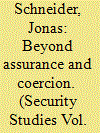

|
|
|
|
|
| Summary/Abstract |
This article examines the proliferation-inhibiting effect of US alliances. Existing explanations for nuclear reversals of US allies have focused either on the assurance that alliances provide or on US threats of abandonment. However, neither model can account for the fact that allied leaders disagreed over the reversal decision. Also, whether an ally agreed to or rejected nuclear restraint depended on which policymakers carried the day as much as on external factors. To explain why some policymakers accept and others refuse nuclear reversal, I draw on a psychological aspect of US alliances: the social pressure inherent in demands by the United States as an ally holding a superior international status. New evidence from Germany and South Korea shows only policymakers who acknowledge this higher rank of the United States, and hence view their own nation as inferior, respond to this social pressure by obeying the US demand for a nuclear reversal.
|
|
|
|
|
|
|
|
|
|
|
|
|
|
|
|
| 2 |
ID:
177065


|
|
|
|
|
| Summary/Abstract |
Is unipolarity durable? IR scholars have offered contradictory answers, with primacists arguing for the longevity of US unipolarity and declinists suggesting the opposite. The literature suffers, however, from two shortcomings: (1) theories of unipolarity built on the sole case of the United States are difficult to generalize; and (2) they tend to focus on the defensive measures available to lesser states while downplaying the proactive means the unipole can adopt to prolong its dominance. To remedy these weaknesses, I propose a model of strategic interaction and apply it to two cases of unipolarity in East Asian history, Ming China (1368–1644) and Qing China (1644–1912). I argue that unipolar durability is an outcome of strategic interactions between the unipole’s proactive measures to sustain its asymmetric power advantage and the potential challenger’s ability to increase its power without drawing the unipole’s military containment. Unipolar durability is contingent, not preordained.
|
|
|
|
|
|
|
|
|
|
|
|
|
|
|
|
| 3 |
ID:
177066
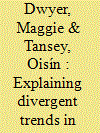

|
|
|
|
|
| Summary/Abstract |
Coups and mutinies have often been treated as broadly equivalent types of behavior. However, they are distinct forms of indiscipline carried out by different sets of actors and have fundamentally distinct goals. This article makes two contributions to the scholarship on both coups and mutinies. First, we offer the first systematic attempt to compare their rates and illustrate the difference in their frequency over time, drawing on data from West and Central Africa. In particular, we identify a striking divergence in the frequency of coups and mutinies over time as well as a set of fluctuations that coincide with the end of the Cold War. Second, we build a new theory to explain these divergent trends. We focus on the role of agency within the military and argue that the upheavals associated with the end of the Cold War were experienced in different ways by junior and senior ranks within armed forces. This, in turn, helps account for variation in the coup and mutiny attempts.
|
|
|
|
|
|
|
|
|
|
|
|
|
|
|
|
| 4 |
ID:
177064
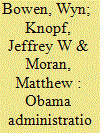

|
|
|
|
|
| Summary/Abstract |
This article examines responses to the Syrian government’s possession and eventual use of chemical weapons (CW) in that country’s civil war from 2012 to 2013. During this time, the United States and other outside powers applied coercive strategies, in both deterrent and compellent modes. Outcomes varied: compellence in the form of coercive diplomacy achieved a partial success, getting Syria to give up much of its chemical stockpile, but there were multiple deterrence failures, culminating in a large-scale sarin gas attack in August 2013. We examine this record to draw lessons about factors associated with the effectiveness of coercion. Our analysis draws on insights from existing research on both deterrence and coercive diplomacy to develop an integrated analytical framework involving the interplay of three factors: credibility, motivations, and assurance. We find the typical default approach to coercion, based on demonstrating toughness and threatening to impose costs using airpower—an approach we call the “resolve plus bombs” formula—was not sufficient to change Syria’s calculations regarding chemical use.
|
|
|
|
|
|
|
|
|
|
|
|
|
|
|
|
| 5 |
ID:
177069
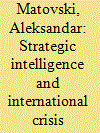

|
|
|
|
|
| Summary/Abstract |
High-quality strategic intelligence is commonly considered to be a stabilizing factor in international relations, steadying decision making and preventing misunderstandings and surprise attacks. This paper challenges this view by arguing that deep intelligence penetrations are some of the most destabilizing forces in high-stakes security crises. By exposing the opponents’ weaknesses and avenues of attack, intelligence penetration not only provides its beneficiaries with a potentially decisive offensive capability but also compels them to use it quickly, before the breach is discovered and the advantage is gone. Also, as the intelligence target is generally unaware of this capability, it does not serve as a deterrent that might force the target to the bargaining table. Thus, paradoxically, opposing sides are more likely to find a peaceful solution to crises when they do not have extensive strategic intelligence on each other.
|
|
|
|
|
|
|
|
|
|
|
|
|
|
|
|
| 6 |
ID:
177067
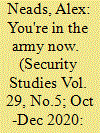

|
|
|
|
|
| Summary/Abstract |
Military integration is intended to facilitate postconflict stabilization by creating unified armed forces from formerly antagonistic armed groups. However, integrated armies often struggle to overcome the factional identities of their soldiers, raising questions about interventionists’ ability to produce military cohesion during such processes. Yet, in the established scholarship on military cohesion, largely derived from the study of Western armed forces, internal small-group social dynamics are privileged over and above broader societal and political identities. This article examines the postconflict military integration program conducted in Sierra Leone to test extant theories of military “social cohesion.” Contrary to theoretical expectations, military cohesion in Sierra Leone proved highly reliant on wider (and highly politicized) societal identities, undermining integration efforts. This finding not only challenges existing understandings of social cohesion and its determinants but also the utility of military integration as a vehicle for postconflict stabilization and civil-military change.
|
|
|
|
|
|
|
|
|
|
|
|
|
|
|
|
|
|
|
|
|